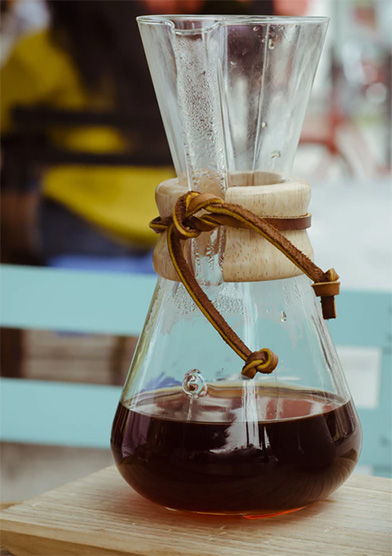Eight popular myths about coffee

Coffee is a favorite habit for most of us. How accurate are the information we know about our beloved beverage?
It's hard to imagine our everyday life without coffee, since for most of us coffee is connected with morning awakening, afternoon relaxation, meeting with friends or closing a joyful dinner. There is a lot of information circulation about coffee that are far from being accurate. In an effort to get to know our favorite habit, we have gathered eight popular myths about coffee: is espresso the strongest coffee? Can we cut the coffee whenever we want and it is right to keep our coffee in the fridge?
 First myth: Espresso, Filter Coffee and Greek coffee are made from different coffee varieties
First myth: Espresso, Filter Coffee and Greek coffee are made from different coffee varieties
Whatever coffee we tend to enjoy, we must know that the raw material is in every case the same: roasted coffee beans. What differentiates, depending on the type of extraction, is the degree of coffee grinding. Certainly, there are blends that are more suitable for preparing an espresso or, on the other hand, blends that give a better result by filter extraction, but in any case, we are talking about the same grains of the same plant. Even instant coffee comes from roasted coffee beans, but they have been properly processed.
Second myth : Only Arabica is quality coffee, Robusta has to be avoided
This particular myth has a basis, as Arabica's coffees actually show more noble, delicate aromas and flavors, unlike the earthiest and bold Robusta. In general, Arabica varieties are more expensive than Robusta, while the specialty blends are usually made of 100% Arabica beans. On the other hand, many factors such as growing conditions, subsoil, processing, roasting, etc., play a role in the quality of coffee. A quality Robusta coffee bean will always be better than a moderate Arabica. Even more importantly, the presence of Robusta gives coffee power, strong body and thick cream, which makes Robusta essential for espresso blends. If you still have doubts, try a blend with 70-80% Robusta, such as Gran Espresso from Lavazza, or even 100% Robusta blends such as Lavazza's Gusto Forte or Amiga's Qualita Rossa!
Third myth : The darker the coffee, the stronger it is
This popular myth was born as many confuse the taste of coffee with its caffeine content. Dark blends (those in which coffee beans have been roasted more than others) have a bitter taste and appear more pronounced in the mouth, but the difference in caffeine content is negligible between different degrees of roasting – in fact, caffeine decreases a little as the roasting degree increases.
 Fourth myth : Coffee shoud be kept in the fridge
Fourth myth : Coffee shoud be kept in the fridgeThough extremely widespread, this belief is a myth. The coffee is best kept in a dry and cool place, away from odors, and always in the right packaging. Naturally, coffee beans have a longer life than ground coffee, and if we open the package, we just look for a solid and airtight container or choose a container specially designed for coffee storage. Storing coffee in the refrigerator not only does not offer freshness and protection, but may make coffee vulnerable to moisture and odors.
Fifth myth: coffee is highly addictive
Or, precisely caffeine is addictive. There is a very small grain of truth in this myth, as caffeine is a substance that affects the central nervous system, which makes it a little addictive. On the other hand, symptoms of deprivation of caffeine have never been recorded, while the time it takes to cut coffee is counted in one and a half days, without any particular inconvenience.
Sixth myth: Coffee slow dows development and thus it should not be consumed by minors
Coffee should not be consumed by children, but not for this reason. Children should stay away from coffee because their nervous system is more sensitive (and hence more affected by caffeine) and because they are unable to metabolize caffeine as efficiently as an adult. However, there are no studies proving that coffee consumption is in any way related to the development of a child.
 Seventh myth: Espresso is the "strongest" coffee
Seventh myth: Espresso is the "strongest" coffee
Perhaps this myth may is partially a truth - it depends on what to we mean by "strong" coffee. Espresso contains less water, and its flavor is more concentrated, so it tastes stronger than coffees that have been produced by other brewing methods. But this does not mean that espresso has a higher caffeine content: filter coffee may have up to twice as much caffeine than an espresso. Caffeine content also depends on the variety of coffee, except for the brewing method used.
Eighth myth: Coffee with milk is very bad for the stomach
This claim, although it is heard often, has no medical basis. If a human organism does not have coffee or milk sensitivity, it will not be sensitive to their combination, nor does milk make coffee ingredients stronger, as people who propagate this legend often claim. Milk, however, increases the (almost zero) calories of coffee and should be consumed in moderate doses, especially if we take care of our diet.
Beyond the myths, there are many truths about coffee. Coffee is the second most popular drink all over the world, it's delicious, enjoyable and has multiple benefits to our health! The next time you enjoy your favorite espresso, cappuccino or filter coffee, let's keep in mind the truth about the beverage you love, not the myths that surround it.










